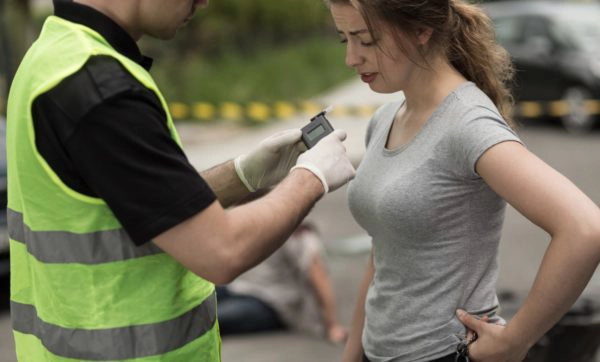Breathalyzer Tests and the Consequences of Refusing to Take One

Can I Legally Refuse A Breathalyzer?
If you get arrested for DWI, you do not have to take a breath test. But, should you refuse, there will be consequences. If you refuse to do a roadside breathalyzer test or the roadside sobriety tests, you won’t get in trouble for that, but you need to be aware the police might still have enough proof to say you were driving while impaired. These roadside tests can be unfair because the police don’t always administer them the same way. While you can refuse the roadside alco-sensor with no legal consequences, the same is not true for the breath or chemical test at the police station. If you decline the breathalyzer test at the station testing site, the Intox EC/IRII, you will face consequences even if you’re found not guilty of drunk driving.
How Does A Breathalyzer Work?
A breathalyzer measures how much alcohol you have on your breath. When you drink alcohol, it goes into your blood and some of it stays on your breath. The breathalyzer uses this alcohol on your breath to find out how much is in your blood.
In North Carolina, police use a breathalyzer called the Intox EC/IR II to check your breath for alcohol. “EC” stands for “electro-chemical” and “IR” stands for “infrared.” This machine takes a deep breath sample to measure your alcohol intake.
When you blow into the tool, your breath goes into a small chamber. The alcohol on your breath reacts with the fuel cell. This reaction makes an electric current. The tool measures the electric current and uses a special formula to figure out how much alcohol is on your breath. The result is then translated from breath to blood at a ratio of 2100:1. The result is shown as an estimation of your blood alcohol content or BAC.

Breathalyzers: Accurate or Not?
A breathalyzer is a machine, and like any machine, it can be influenced by outside factors. Some of these include:
- The machine may be malfunctioning.
- Operator error is possible.
- Certain health problems, like acid reflux or diabetes, can affect the results.
- Breath tests should be performed several times to produce a reliable result.
- There could be a substance present in the mouth that contains alcohol which will produce a false positive.
- Sometimes a false positive can result from the presence of paint fumes, varnish, or other chemicals in the environment.
- If the machine is not cleaned properly there could be condensation in the system which will affect the results.
It’s important to remember that each case is different and the reasons why a test might not be accurate can vary.
Implied Consent and Your Rights
In North Carolina, if the police stop you and suspect you’ve been driving while impaired, they can ask you to take a test to see how much alcohol you have in your system provided they have “probable cause.” Probable cause is generally established when someone performs poorly on the roadside sobriety tests, blows over the limit on the roadside alco-sensor test, or refuses to take the roadside tests. In these situations, the person will be taken to a testing site and asked to take an official breath test. Under the implied consent concept contained in NCGS 20-16.2, the law assumes that by accepting your driver’s license you have “implied that you will consent to a breath test.” In other words, when you get in the car to drive, the State assumes you will agree to take the test if asked. You can say no to the breathalyzer, but if you do, your driver’s license will be taken away for at least 30 days through a civil revocation order.
The person administering the test, the Chemical Analyst, will fill out a written statement about the results of the test, or your refusal, and have it notarized. This sworn statement is called an Affidavit, and it can be used instead of in-person testimony at any hearing or trial against you. Then the Chemical Analyst’s Affidavit will be mailed to the DMV in Raleigh. If the Chemical Analyst’s Affidavit states that you willfully refused a breath test, you will receive a letter advising that your license is going to be revoked for a year for a “refusal suspension.” You have ten days to request a hearing to contest the willful refusal at an administrative hearing at the DMV.
The police will also use the fact that you refused the official test in court as evidence that you were driving while impaired.
Search Warrants and Your Blood
If you refuse to take a breath test after you’ve been arrested for DWI, the police will often try to obtain a search warrant for your blood instead. If the Magistrate grants a search warrant, the police will take you to a hospital or a clinic, or possibly an EMS station, to have your blood taken by a nurse or EMT. The police will then send your blood to a lab to be tested. In this situation, you may face a worst-case scenario where the state still obtains your BAC, and your license is suspended for a year. The police will use both the fact that you refused the breathalyzer and the results from the blood test against you in court.
Limited Driving Privileges: Will You Qualify?
It’s important to know that in North Carolina, under law NCGS 20-16.2, you have the right to talk to an attorney before you decide whether or not to take any chemical test. However, you are only given 30 minutes to get through to a lawyer or have a witness appear at the testing site.
If your license is suspended due to your refusal to take a breathalyzer test, you will not be able to obtain limited driving privileges for the first six months of your twelve-month refusal suspension. Which means you cannot drive at all. A refusal suspension comes from the North Carolina Department of Motor Vehicles (NCDMV) and not from the court. After six months have passed, provided you’ve settled your DWI case, a judge may then grant you limited driving privileges at their discretion.
Limited driving privileges issued by a judge in North Carolina may require an ignition interlock. But where and when are you allowed to drive when you have limited driving privileges? Attorney Clarke Dummit explains this driver’s license restriction.
Challenging A Refusal Suspension
You can fight a one-year license suspension by asking for a hearing at the DMV. Once the Chemical Analyst’s Affidavit is received and processed by the NCDMV they will send you a letter to tell you about the suspension. If you don’t ask for a hearing within the time limit, the suspension will stay in place for one year from the date on the letter.
Only if you pay the hearing fee of $450.00 and properly request the hearing, will the DMV Hearing Officer hold a hearing to figure out if you really refused to give a breath sample and if it was a willful and conscious choice. The Chemical Analyst, who submitted the Affidavit doesn’t have to come to the hearing unless your attorney raises an objection to their Affidavit.
Contact Us
If you have refused a breathalyzer test, it’s a good idea to talk to a lawyer. Refusing the test will lead to license suspensions and possible legal charges. An experienced DWI attorney can help you understand the consequences you could face for refusing the test and suggest the best plan of action for your situation. That’s where Dummit Fradin comes in. Our team of DWI attorneys has been attending DMV hearings for 30 years. We have experienced lawyers who are well-versed in North Carolina’s DWI and Implied Consent Laws. We can help explain your rights and options to you. Contact us to talk about your case right away.
Visit One of Our Office Locations

Winston-Salem
Criminal & Immigration Attorneys
1133 West First Street
Winston-Salem, NC 27101
(336) 485-4907
Greensboro
Criminal & Family Attorneys
328 E. Market Street
Greensboro, NC 27401
(336) 360-5528
Winston-Salem
Family Law Attorneys
3400 Healy Drive
Winston-Salem, NC 27103
(336) 962-7221
Our service area includes Alamance County, Davidson County, Davie County, Forsyth County, Guilford County, Randolph County, Surry County, Stokes County, and Yadkin County.
